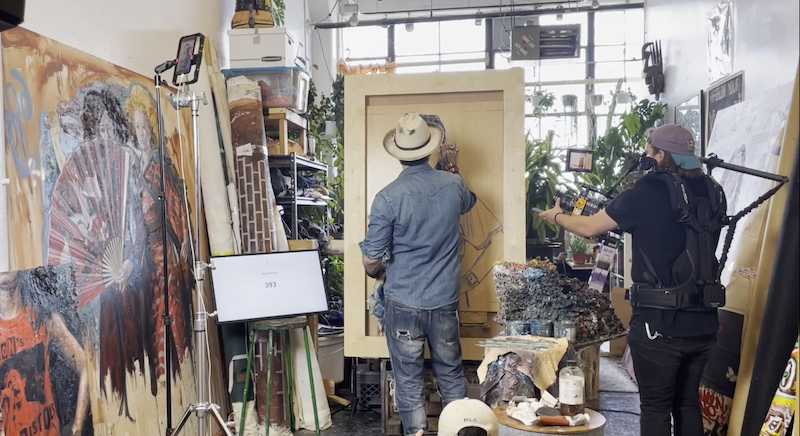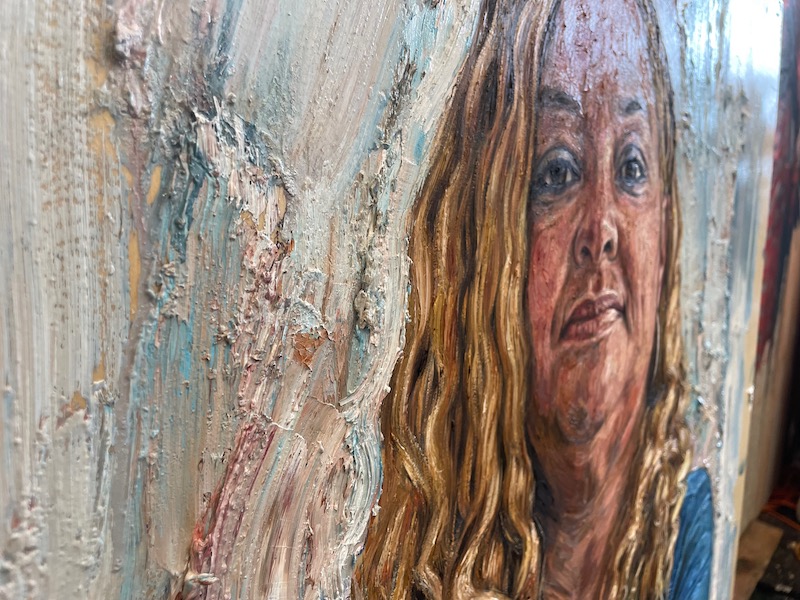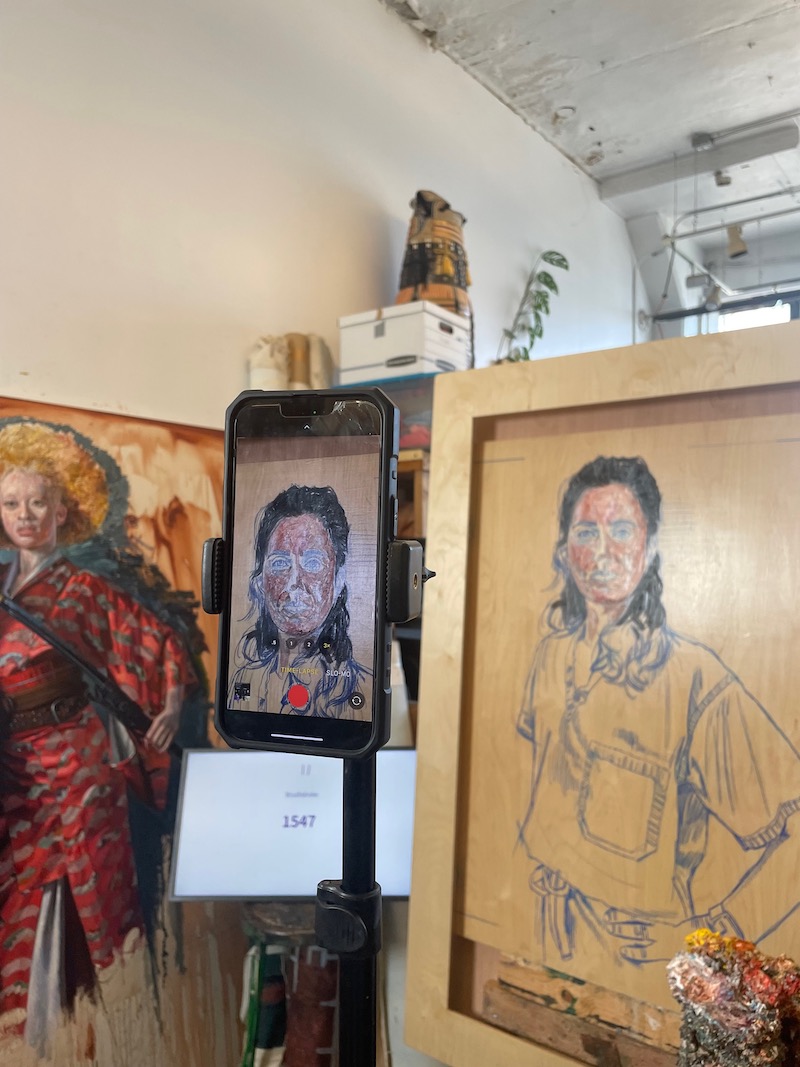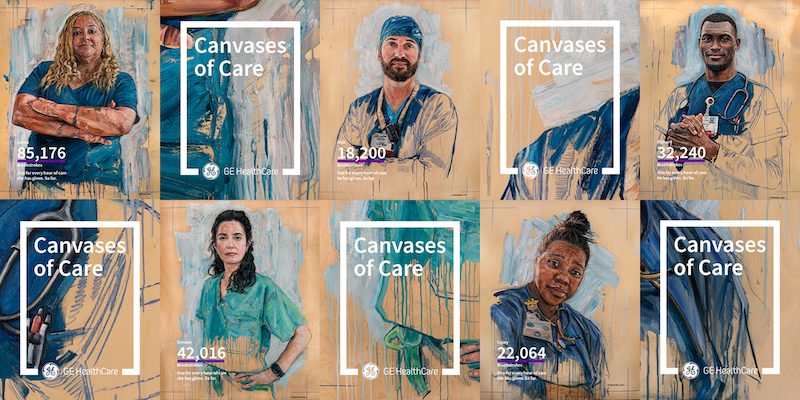In the spring of 2020, while he was recovering from COVID-19, the artist Tim Okamura spent a lot of time watching the nurses go in and out of Wyckoff Heights Medical Center, across the street from his apartment in Brooklyn. Every evening he joined his fellow New Yorkers in cheering for the city’s healthcare workers, but he felt he could be doing more.
Okamura, a Japanese Canadian painter who has lived in New York for the past 30 years, specializes in portraits of people who have traditionally been underrepresented in art. “I have this sort of calling,” he says. It occurred to him that the best thing he could do was to paint portraits of frontline workers. Through a friend, he connected with the COVID unit of a hospital in Brooklyn and began spending time getting to know the nurses before he painted their pictures. Eventually the portraits grew into a series called Health Care Heroes, and one of the paintings was featured in a show at the New-York Historical Society that also contained a work by Picasso.
“I was glad to have the opportunity to work with nurses and say, ‘We see you,’” he says now. “That’s something that portraiture does very well: to shine a light on people who have not been seen in that context before. A painting can capture emotion and delve deeper into their heroism.”
When GE HealthCare began considering ways to observe National Nurses Week, May 6–12 (culminating with Florence Nightingale’s birthday), it wanted to do something that would bring nurses into the public spotlight. “Our brand is about courage, compassion, and grit,” says Kate Rodgers, GEHC’s global brand media director. “Nurses embody that, and they often go unseen and unrecognized.”
With the help of the creative agency BBDO, which has worked with GE for more than a century, Rodgers and her team tried to figure out the best way to make the public really see nurses — literally. At first they considered a photography project, but then BBDO had a better idea: a series of paintings depicting real nurses, with one brushstroke for every hour of care they’d contributed over the course of their careers. The paintings would remain unfinished, because a nurse’s work is never done.
After that, the project, called Canvases of Care, came together quickly. The team reviewed the work of several artists, but they all immediately decided that Okamura was the obvious choice. He, in turn, was pleased to be able to continue his earlier project. “It’s been so rewarding to get affirmation that the idea was right and necessary,” he says.
The next question was which nurses should be painted. There are, after all, almost five million nurses in the United States (and 27 million worldwide), and they are a very diverse group of people, not just in terms of gender, race, and ethnicity, but also background, experience, and areas of expertise. Rodgers and her team reached out to hospitals and clinics that worked with GE HealthCare and asked them to nominate nurses they thought should be recognised. They also decided they should honor one of their own clinical experts and chose Leona Gregory, a NICU nurse who currently works as a clinical product surveillance leader, improving patient safety measures for maternal infant care equipment.
The other four nurses are Simone Hannah-Clark, a pulmonary nurse practitioner at Mount Sinai Hospital, in Manhattan, who in April 2020 published an essay in The New York Times about her work in the COVID ICU; Casey Green, a critical care nurse at LifeBridge Health, in Baltimore, an adjunct professor at Towson University, and one of fewer than 100 nurses to have attained all five emergency nursing certifications; Richard Onyait, a Ugandan refugee who is now an RN at UW Health, at the University of Wisconsin–Madison; and Nicholas Sydow, a radiology nurse, also at UW Health, who has overcome cancer himself.
Collectively, the five nurses have nearly 200,000 hours of experience. Which meant Okamura had almost 200,000 strokes to paint, and roughly a month to finish the portraits. His assistant initially suggested that he count the strokes of one of the portraits by hand, but, he says, “I thought my head would explode if I ever tried to do that.” Instead he installed an infrared frame over the top of the painting surface that kept track for him. Each of the paintings is 36 by 48 inches, done in oils on a wooden panel. With the more experienced nurses, particularly Gregory, who has clocked more than 84,000 hours over her 30-year career, the large number of strokes has resulted in thicker layers of paint that he says give the portraits a sculptural quality.
Normally Okamura likes to get to know his subjects before he paints them, but for Canvases of Care, with nurses’ schedules being what they are, he had to work from photographs. Fittingly, all the photos were taken by other nurses, and Okamura provided suggestions about poses and lighting.
“I’m hoping I can do them justice,” says Okamura, “and that they’ll enjoy the results. I haven’t spoken to them, but I can see them coming to life on my easel. I feel empathy in all of their faces. I just feel like I’m seeing some truly kind humans.”
One portrait will be shared on GE HealthCare’s social media each day starting May 6. On May 12, a time-lapse video showing the creation of Hannah-Clark’s portrait will run on the Nasdaq billboard in Times Square for one minute every hour, all day long.
All five of the nurses are excited to be part of the project but also a bit embarrassed by the attention. “It’s not that I’m not honored and grateful,” explains Hannah-Clark. “It’s the way we roll. A nurse is always in the background; most of what we do is unseen. It’s fitting that everybody is a little apprehensive about being in the spotlight.”
Rodgers, though, has no doubt that the nurses are worthy of the accolades. “We really felt like it was the right thing to do,” she says. “It’s magic when something comes together like this, especially when you get to honor truly spectacular people who represent a greater body of spectacular people.”









